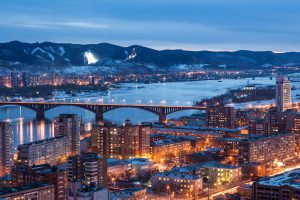
Krasnoyarsk is one of the largest cities in Russia. It is also the largest cultural, educational, economic and industrial center of Central and Eastern Siberia. Krasnoyarsk is unofficially called the capital of Siberia due to its important role for the region. We will go further to see why it has been Northern Caucasus’ center of economy and culture.
Brief History of Krasnoyarsk
Before the arrival of the Russians, the territory of modern Krasnoyarsk was part of the Yezher principality of the Yenisei Kyrgyz. In 1659 the Krasnoyarsk prison was erected. The construction of a new prison caused discontent among the local population, which consisted mainly of tributaries, “Kyshtyms” of the Yenisei Kyrgyz, whose rulers, in turn, were vassals of the state of Altan Khan (North-Western Mongolia). In 1667 and 1679, the prison was besieged twice by a strong army of the Kyrgyz commander Irenek Khan. In 1690, the Krasnoyarsk prison was granted city status.
The gradual growth of Krasnoyarsk began with the arrival of the Siberian Highway in the city in 1735 (now the federal highway P255 Sibir), which connected Krasnoyarsk with Achinsk, Kansk and other parts of the country. However, as early as 1772, the population of the city was only about two thousand inhabitants, and Krasnoyarsk remained a small district city.
Further growth of the city was associated with the opening of gold mines in the province and the advent of the railway in 1895. The supply of rails for the construction of the Trans-Siberian Railway was carried out by the Northern Sea Route. After the conclusion in 1893, the Russian government trade agreement with the United Kingdom of Scotland released a joint Russian-English caravan under the command of the English captain Wiggins. A caravan loaded with railway rails overcame the Arctic Ocean, the Kara Sea and safely reached the mouth of the Yenisei. From the village of Golchikhathe rails were transported along the Yenisei to Krasnoyarsk. This expedition was the first to pave the northern route from Europe to Siberia.
Krasnoyarsk is the largest cultural and economic center of Central and Eastern Siberia, the administrative center of the Krasnoyarsk Territory (the second largest Russian subject). The city is located on both banks of the Yenisei at the junction of the West Siberian Plain, the Central Siberian Plateau and the Sayan Mountains, in a basin formed by the northernmost spurs of the East Sayan. It is the largest city in Eastern Siberia and the Far East. The Yenisei, on which Krasnoyarsk stands, divides Siberia into Western and Eastern, the city itself is approximately halved, and the last Sayan Range has entered the line of Krasnoyarsk. The city is the center of East Siberian Economic Region.
Krasnoyarsk is one of the most compact million-plus cities in Russia. From west to east, the length of the city is about 41 kilometers, from north to south – almost 37 kilometers. About 670 thousand inhabitants live in the left-bank part of Krasnoyarsk.
The Economics
The city is divided into two parts by the Yenisei; its left-bank part is in Western Siberia, the right- bank part is in Eastern. At the same time, the city is assigned to Eastern Siberia by economic geographers.
Krasnoyarsk is a developed center of industry in Russia. On the territory of Krasnoyarsk there are more than seventeen thousand enterprises, organizations, and institutions. Leading industries include space industry, non-ferrous metallurgy, mechanical engineering, woodworking, transportation, chemical, food, retail and wholesale, and services. In Krasnoyarsk, there is a representative office in the Siberian Federal District of the Federal State Unitary Enterprise. One of the largest waste recycling plants in Russia was built in the city, designed to process ten thousand tons of garbage per day. There are also waste sorting complexes.
According to experts of the INFOLine-Analytics agency, Krasnoyarsk is in second place in Russia in terms of saturation with supermarkets. Krasnoyarsk residents prefer to spend their money in stores: in 2011, the organization accounted for 94.9% of the retail turnover; the share of sales of goods on the markets amounted to only 5.1%, having lost more than two percentage points since the year before last, and since 2008 – more than 3%. Krasnoyarsk is one of the most attractive cities for business. It also ranks second in Russia in terms of per capita provision of restaurants.
The Culture of Krasnoyarsk
Krasnoyarsk “Pillars” – a visiting card of the city, nominated for the UNESCO World Heritage Site. The Paraskeva Friday Chapel is a symbol of Krasnoyarsk, a monument of architecture and history (depicted on a ten-ruble banknote of Russia). Flora and Fauna Park “Royev Ruchey ” is one of the largest zoos in Russia. The Swarm Stream currently presents the largest collection in terms of number of species among the zoos of the Urals, Siberia, and the Far East and the second most numerous collection after the Moscow zoo. Numerous sculptures also belong to the sights of Krasnoyarsk. By the volume of the museum fund, the Krasnoyarsk Territory is now one of the ten constituent entities of the Russian Federation and takes first place in the Siberian Federal District. The museum fund of the region has more than 1.3 million storage units – this is the largest museum collection beyond the Urals. Most of it is exhibited or stored in Krasnoyarsk.
There are also many theaters, cinemas, libraries and parks spread around the city. A handful of regular events are held in the city that people from all over Russia as well as the world look forward to attending. The tourism bloom easily in Krasnoyarsk and it is easy to find good hotels, dining places, and tourist attractions around the city. With all being explained, it is now clear why Krasnoyarsk is considered the economic and cultural center of Northern Caucasus.
